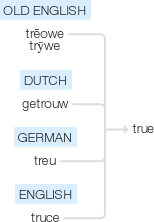True
Old English trēowe, trȳwe ‘steadfast, loyal’; related to Dutch getrouw, German treu, also to truce.
wiktionary
From Middle English trewe, from Old English trīewe, (Mercian) trēowe(“trusty, faithful”), from Proto-Germanic *triwwiz (compare Saterland Frisian trjou(“honest”), Dutch getrouw and trouw, German treu, Norwegian and Swedish trygg(“safe, secure’”), from pre-Germanic *drewh₂yos, from Proto-Indo-European *drewh₂-(“steady, firm”) (compare Irish dearbh(“sure”), Old Prussian druwis(“faith”), Ancient Greek δροόν(droón, “firm”)), extension of *dóru(“tree”). More at tree.
For the semantic development, compare Latin robustus(“tough”) from robur(“red oak”).
etymonline
true (adj.)
Old English triewe (West Saxon), treowe (Mercian) "faithful, trustworthy, honest, steady in adhering to promises, friends, etc.," from Proto-Germanic *treuwaz "having or characterized by good faith" (source also of Old Frisian triuwi, Dutch getrouw, Old High German gatriuwu, German treu, Old Norse tryggr, Danish tryg, Gothic triggws "faithful, trusty"), from PIE *drew-o-, a suffixed form of the root *deru- "be firm, solid, steadfast."
Sense of "consistent with fact" first recorded c. 1200; that of "real, genuine, not counterfeit" is from late 14c.; that of "conformable to a certain standard" (as true north) is from c. 1550. Of artifacts, "accurately fitted or shaped" it is recorded from late 15c. Of aim, etc. "straight to the target, accurate,," by 1801, probably from the notion of "sure, unerring."
True-love (n.) is Old English treowlufu. True-born (adj.) first attested 1590s. True-false (adj.) as a type of test question is recorded from 1923. To come true (of dreams, etc.) is from 1819.
true (v.)
"make true in position, form, or adjustment," 1841, from true (adj.) in the sense "agreeing with a certain standard." Related: Trued; truing.
